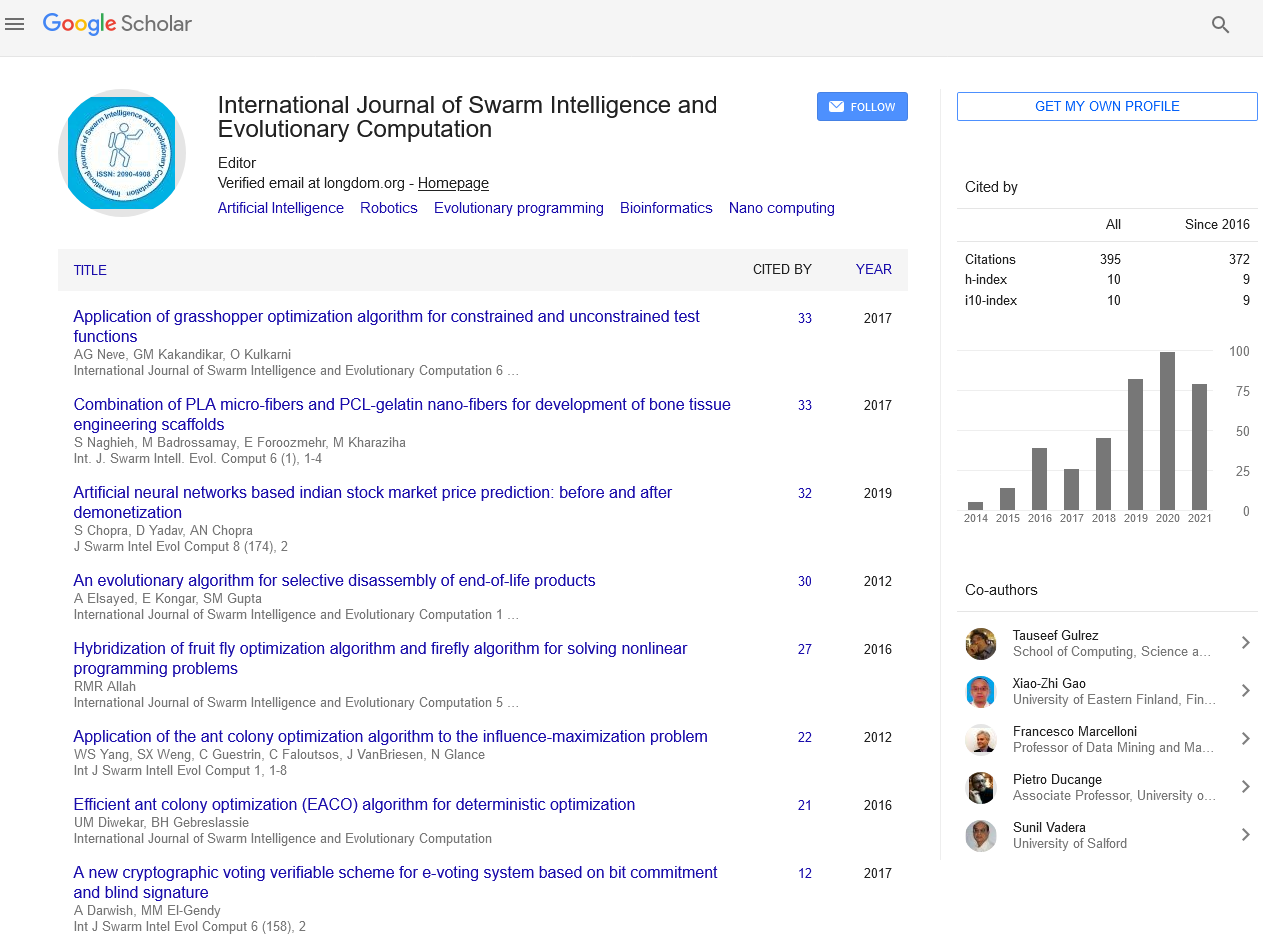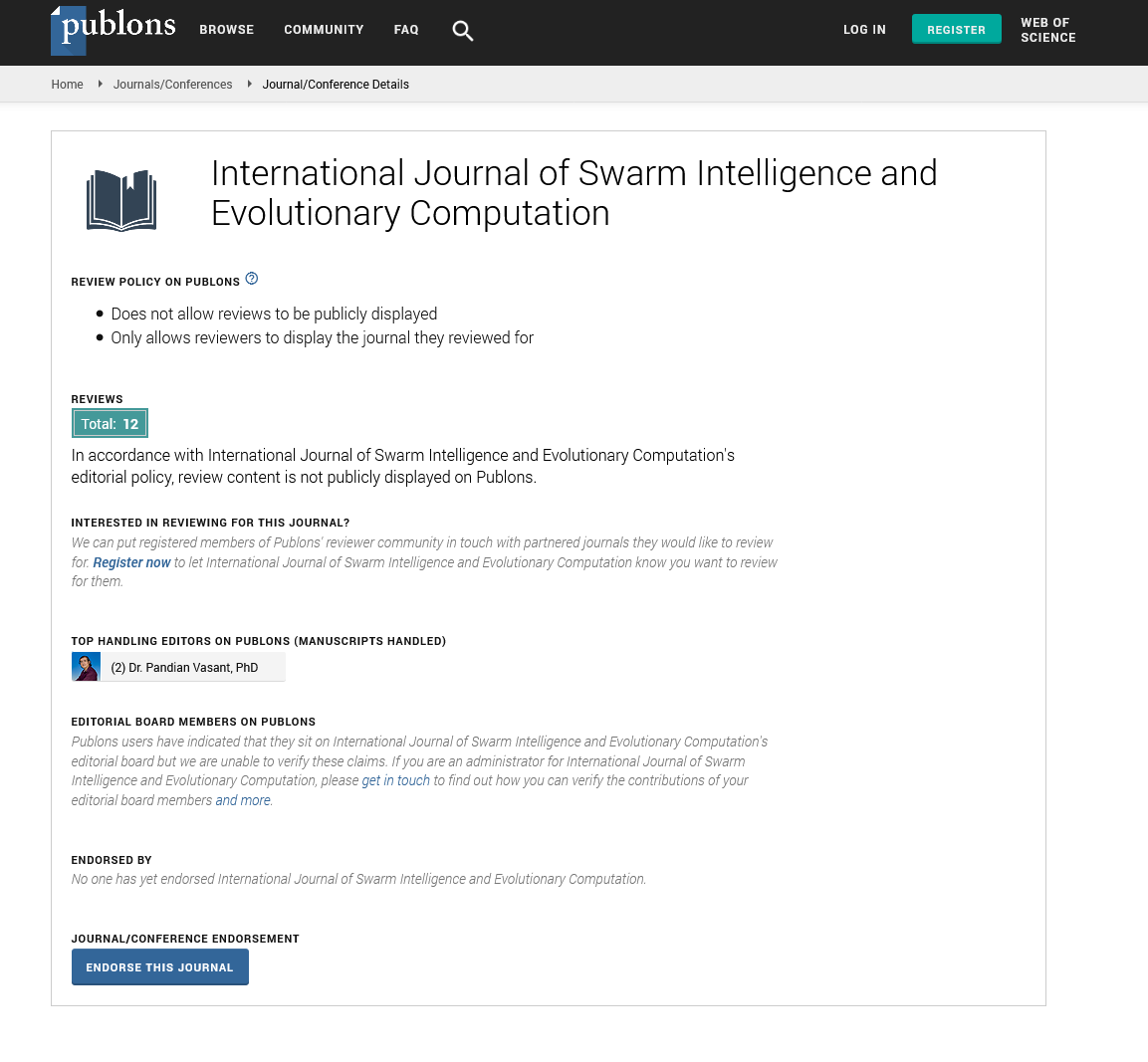Indexed In
- Genamics JournalSeek
- RefSeek
- Hamdard University
- EBSCO A-Z
- OCLC- WorldCat
- Publons
- Euro Pub
- Google Scholar
Useful Links
Share This Page
Journal Flyer

Open Access Journals
- Agri and Aquaculture
- Biochemistry
- Bioinformatics & Systems Biology
- Business & Management
- Chemistry
- Clinical Sciences
- Engineering
- Food & Nutrition
- General Science
- Genetics & Molecular Biology
- Immunology & Microbiology
- Medical Sciences
- Neuroscience & Psychology
- Nursing & Health Care
- Pharmaceutical Sciences
Opinion Article - (2024) Volume 13, Issue 2
Navigating Complexity: Exploring Ontology Engineering in Knowledge Representation
Maria Wilson*Received: 01-Mar-2024, Manuscript No. SIEC-24-25341; Editor assigned: 04-Mar-2024, Pre QC No. SIEC-24-25341 (PQ); Reviewed: 18-Mar-2024, QC No. SIEC-24-25341; Revised: 26-Mar-2024, Manuscript No. SIEC-24-25341 (R); Published: 04-Apr-2024, DOI: 10.35248/2090-4908.24.13.366
Description
Ontology Engineering emerges as a critical discipline aimed at capturing and formalizing domain knowledge in a structured and machine-interpretable manner. From its conceptual underpinnings to its practical applications, ontology engineering plays a pivotal role in knowledge representation, semantic interoperability, and intelligent system development. This section introduces the core concepts and historical context of ontology engineering, setting the stage for a detailed exploration.
Foundational principles of ontology engineering
At the heart of ontology engineering lie several foundational principles:
Conceptualization: Ontology engineering begins with the conceptualization of domain knowledge, involving the identification of relevant concepts, entities, and relationships.
Formalization: Formal languages such as RDF (Resource Description Framework) and OWL (Web Ontology Language) are employed to specify ontologies in a machine-interpretable format, enabling automated reasoning and inference.
Hierarchy and taxonomy: Ontologies often exhibit hierarchical structures, with concepts organized into taxonomies or class hierarchies to represent subsumption and specialization relationships.
Relationships and properties: Ontologies define relationships and properties between concepts, enabling the representation of complex semantic associations and constraints within a domain.
Reuse and integration: Ontology engineering encourages the reuse and integration of existing ontological resources to facilitate interoperability and reduce redundancy across knowledge bases.
Methodologies in ontology engineering
Ontology engineering methodologies provide systematic approaches for ontology development, including:
Top-down approach: Starting from high-level domain concepts and gradually refining the ontology structure based on domain analysis and stakeholder input.
Bottom-up approach: Deriving ontology concepts and relationships from existing data sources, documents, or knowledge repositories through automated or semi-automated methods.
Hybrid approach: Combining elements of both top-down and bottom-up methodologies to leverage existing ontologies while accommodating specific domain requirements and constraints.
Iterative development: Embracing an iterative development process to incrementally refine and extend the ontology based on feedback from domain experts and application users.
Applications of ontology engineering
Ontologies find applications across diverse domains and applications, including:
Semantic web: Enabling semantic annotation, data integration, and knowledge sharing on the World Wide Web (WWW).
Healthcare: Facilitating clinical decision support, patient data interoperability, and medical knowledge representation.
Biomedical informatics: Supporting biological and medical data integration, drug discovery, and personalized medicine.
E-commerce: Enhancing product categorization, recommendation systems, and semantic search capabilities.
Manufacturing: Enabling supply chain management, product lifecycle management, and process optimization.
Intelligent systems: Powering reasoning engines, expert systems, and natural language understanding applications.
Challenges in ontology engineering
Ontology engineering encounters several challenges, including:
Knowledge acquisition: Acquiring domain knowledge from diverse sources and stakeholders while ensuring completeness, consistency, and accuracy.
Ontology evaluation: Assessing the quality, coherence, and relevance of ontologies using metrics, evaluation frameworks, and validation techniques.
Interoperability: Achieving semantic interoperability across heterogeneous ontologies and knowledge bases to enable seamless data exchange and integration.
Evolution and maintenance: Managing ontology evolution and versioning to accommodate changes in domain knowledge, requirements, and technology advancements.
Tool support: Availability of effective ontology engineering tools and platforms to facilitate ontology development, visualization, and management.
Future directions and emerging trends
Ontology engineering continues to evolve, with several emerging trends and future directions, including:
Ontology learning: Automated methods for ontology construction and population from unstructured or semistructured data sources.
Ontology alignment: Techniques for aligning and reconciling heterogeneous ontologies to enable seamless integration and interoperability.
Semantic reasoning: Advanced reasoning techniques for inferencing and semantic querying over large-scale ontologies and knowledge graphs.
Ontology evolution: Dynamic and adaptive approaches for ontology evolution and maintenance in response to changing domain requirements and environments.
Domain-specific ontologies: Development of specialized ontologies tailored to specific domains, applications, and use cases to enhance semantic understanding and reasoning capabilities.
Conclusion
In conclusion, Ontology Engineering serves as a cornerstone in knowledge representation, semantic interoperability, and intelligent systems development. By systematically capturing and organizing domain knowledge, ontologies enable effective information retrieval, sharing, and integration across diverse applications and domains. As research and development in ontology engineering continue to advance, the potential for leveraging ontologies to facilitate knowledge management, semantic reasoning, and intelligent decision-making remains immense, promising to reshape industries, enhance collaboration, and drive innovation.
Citation: Wilson M (2024) Navigating Complexity: Exploring Ontology Engineering in Knowledge Representation. Int J Swarm Evol Comput. 13:366.
Copyright: © 2024 Wilson M. This is an open-access article distributed under the terms of the Creative Commons Attribution License, which permits unrestricted use, distribution, and reproduction in any medium, provided the original author and source are credited.


